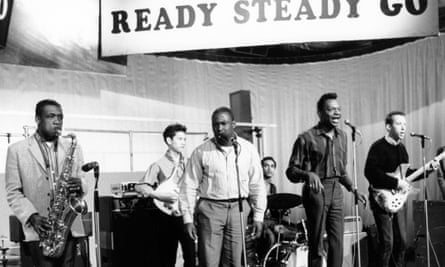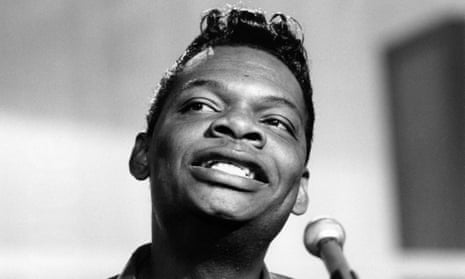The singer and actor Count Prince Miller, who has died aged 84, made his name with a reggae version of the song Mule Train in the early 1970s and later as the character Vince in the long-running Channel 4 sitcom Desmond’s. Born in Jamaica but based in Britain, Miller was a stage performer rather than a recording artist before the release of Mule Train in 1971. A light-hearted cowboy tune previously covered by Frankie Lane and Bing Crosby, it had been a crowd-pleasing staple of his live act for many years, and was committed to vinyl only by accident.
On a trip back to Jamaica he dropped into a recording studio to pass the time with some fellow musicians. They pressed him into singing his version of the song and he duly delivered, with a smattering of exaggerated giddyup shouts, grunts and blubbering noises, unaware that the tape was running. To his surprise it was sitting at the top of the Jamaican charts within a couple of weeks. A smash in the rest of the Caribbean, it was also released in the UK, where it made an impact for Trojan Records. Miller never received a penny for his efforts, but was relaxed about the situation because it put him on the map.
A number of other recordings followed, but in the longterm he used the renown he gained from Mule Train to move into other areas of entertainment, including show compering and, in later years, acting in theatre, films and television.
Miller’s role as Vince in Desmond’s, a sitcom based around a black barber’s shop run by Desmond Ambrose (Norman Beaton), began as a bit part but became stronger as Vince graduated from being a customer and friend of Desmond into an assistant hairdresser. The show, which attracted up to five million viewers a week at its peak, lasted for 71 episodes from 1989 to 1994, and Miller was a regular in its less successful spin-off series, Porkpie, which ran for two seasons in 1995-96. Nothing with such a high profile followed, but he continued to appear in films and theatrical roles into his 80s.

Born Clarence Miller in the village of Padgetts near Port Maria in north Jamaica, he moved with his mother at the age of 10 to the capital, Kingston, where he attended Stewarts school in the city’s Greenwich Town area and was much inspired by the music of Nat King Cole and Sam Cooke. Though he could never master an instrument, he was a natural singer and dancer, and as a teenager became the front man for a group called the Downbeats.
When they split up in 1961 he had a sojourn with the proto-ska band the Jiving Juniors, made a brief appearance in the 1962 James Bond film Dr No as a frenzied nightclub dancer, and performed at Jamaica’s independence celebrations. Thereafter he began to make his way as a solo singer, finding work abroad with residencies at clubs in Canada and Bermuda and on various Caribbean show circuits.
As much an all-round entertainer as a singer, Miller made an asset and trademark of his huge mouth, which he claimed was so big when he opened it that “me top lip cover me eye”. Much of his high energy material was comic, upbeat and rather risque, and it was only a printing error on an early handbill that changed his intended stage name of Clown Prince Miller into Count Prince Miller.
In the early 60s he was so well regarded in the Caribbean that for three years he shared the bill with visiting stars such as Ray Charles, Chubby Checker and Chuck Berry at the Jamaica Hilton, playing to jetset audiences. In 1964 Byron Lee and the Dragonaires asked him to tour with them in north America as one of their singers, but instead he took up a rival offer from another Jamaican show band, the Vagabonds, who were on their way to Britain.
The Vagabonds played initially at West Indian clubs in London, but their popularity soon spread wider (an approving review by George Melly in the Observer mentioned their “great raver called the Count”), and they appeared on television shows such as Ready Steady Go.
Partly due to Miller’s engaging stage antics they were enlisted to perform weekly at the Marquee club in London after supporting the Who there, and their 1964 album Ska Time, featuring Miller on the cover, was one of the first ska-oriented offerings to be recorded in Britain. Within short order Miller had sold his return ticket to Jamaica and settled in London.
As his showman’s talents began to provide him with work in other areas, he eventually dropped back to be a secondary singer for the Vagabonds in favour of his friend and fellow Jamaican, Jimmy James. In 1969 he was compere for the pioneering Caribbean music festival at Wembley stadium in London – the first major reggae event to be held in Britain – and after the release of Mule Train he became a prominent supporter of the reggae sound system movement in the UK, especially with the sound system operator Wilbert “Count Suckle” Campbell.
Over the following years, Miller became the go-to emcee for shows featuring Jamaican artists visiting Britain, from Bob Marley and the Wailers to Dennis Brown. He continued to make singles sporadically, and in 1981 Mule Train was reworked by Sly and Robbie. By then, however, his focus had begun to turn to acting.
In 1987 Miller played Marcus Garvey in JD Douglas’s stage musical Black Heroes in the Hall of Fame, which began as a community project at the Shaw theatre in London before moving to the West End at the Astoria in 1989 and touring in the US. In 2012 he appeared as the compere in another successful Douglas musical, JA Story, which travelled the UK to celebrate the 50th anniversary of Jamaica’s independence.
In film he won the best male actor award at the Black Film-makers’ International awards for his role as Grandpa Dunbee in the British short film Winnie and the Duppy Bat (2006). He also featured as Carlton McNally, a wise punter among foolish gamblers, in the British crime comedy Smoking Guns (2016), and as an elderly patient in Kingsman: The Golden Circle (2017).
Last year he appeared as a grandfather in the first UK-wide television advertising campaign, for Ikea, to feature an all-black family.
In 2007 he was made a Commander of the Order of Distinction by the Jamaican government for his contribution to music.
He is survived by his son, Jean-Pierre, from his 1968 marriage to Verna McKenzie Hastings, which ended in divorce in 1974.

Comments (…)
Sign in or create your Guardian account to join the discussion